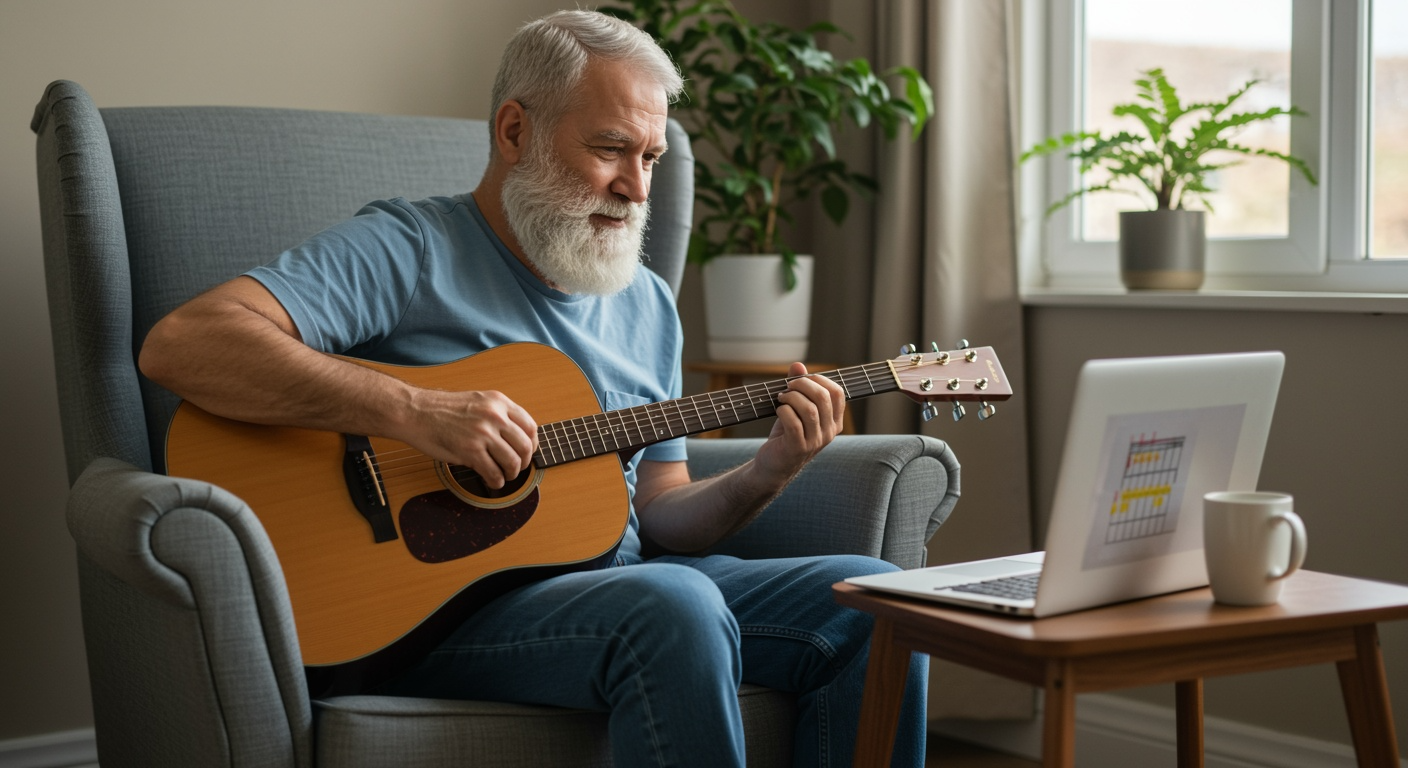Why Learning to Play an Instrument Is Good for Retirees and Seniors: The Complete 2025 Guide (Verified Research Edition)

Learning a musical instrument after retirement offers significant benefits for cognitive health, social connection, and overall well-being. Recent scientific research provides compelling evidence that it's never too late to start making music, with studies showing measurable improvements in brain function, memory, and quality of life for older adults who take up musical training.
The Science Behind Music and Aging
Cognitive Benefits: What the Research Really Shows
A comprehensive 2024 longitudinal study published in BMC Geriatrics followed 156 musically naive older adults (average age 69.5 years) from Hannover and Geneva over one year. Participants engaged in either weekly piano practice or music culture sessions. The research found that the piano practice group demonstrated moderate improvements in piano articulation and dynamics, while modest improvements were observed in melodic discrimination and musical scale analysis in both groups.
While these improvements were described by researchers as "modest" rather than dramatic, they represent meaningful gains for older adults who had never previously engaged with music. The study also noted that higher global cognitive functioning was associated with greater performance in melodic discrimination for both groups.
Long-Term Brain Protection
Even more compelling evidence comes from a 4-year longitudinal study published in Imaging Neuroscience in 2025. Researchers tracked 53 older adults and found that those who continued musical training showed better preservation of verbal working memory performance and right putamen gray matter volume over 4 years. The study demonstrated that continued musical training led to enhanced cerebellar function and reduced reliance on other brain regions for compensation.
This research provides longitudinal evidence that initiating musical instrument training in older adulthood can help counteract age-related cognitive and brain decline.
Dementia Risk Reduction: Understanding the Evidence
One of the most striking findings in music and aging research comes from a systematic review and meta-analysis. A twin study found that musicians were 64% less likely to develop mild cognitive impairment or dementia, after additionally adjusting for sex, education and physical activity.
However, it's important to understand the limitations of this research. The authors note that the evidence base is limited by size, small sample sizes and the risk of reverse causality, and results should be interpreted with caution. Larger, more focused studies are needed to further explore this association.
Social and Emotional Benefits
Addressing Social Isolation
Social isolation is a significant concern for older adults. According to the University of Michigan's 2023 National Poll on Healthy Aging, 34% of adults aged 50-80 reported feeling isolated from others (29% some of the time, 5% often) in the past year. This represents a substantial portion of the older adult population dealing with loneliness.
Musical activities, particularly group lessons or ensembles, provide structured opportunities for social interaction and can help reduce these feelings of isolation. The social aspect of music-making creates natural connections between participants and can lead to lasting friendships.
Mental Health and Mood
Research consistently shows that musical engagement can improve mood and reduce anxiety. According to a 2020 report from the AARP-founded Global Council on Brain Health, musical activity can improve memory and mood in older adults. Musical engagement activates the brain's reward systems and can help reduce stress hormone levels.
Physical Benefits
Learning to play an instrument can also provide physical benefits:
- Motor Function: Piano and string instruments enhance finger dexterity and bilateral coordination
- Breathing: Wind instruments like the harmonica can improve breath control and lung function
- Posture and Balance: Many instruments require good posture, which can help with overall physical stability
Choosing the Right Instrument: Evidence-Based Recommendations
Based on expert recommendations and accessibility research, here are the most suitable instruments for seniors:
1. Piano
Why it works for seniors: The piano is excellent for hand-eye coordination and cognitive engagement, requiring the use of 10 fingers, reading music, and interpreting musical pieces. Learners can start with one hand and gradually increase complexity.
Getting started: Despite having 88 keys, only 12 keys repeat across the keyboard, making it easier to understand than it initially appears.
2. Ukulele
Why it works for seniors: With only four strings and a smaller fretboard, the ukulele is less intimidating than a guitar. You can get a good sound from a ukulele straight away, just by strumming the four open strings, according to John Atkins, a ukulele instructor.
Getting started: Some basic chords require only one finger, and the nylon strings are gentler on fingertips than steel guitar strings.
3. Harmonica
Why it works for seniors: Grammy-nominated harmonica player David Barrett notes that the harmonica has only the 'right notes' since it's designed to play in one key. It requires minimal breath and is highly portable.
Getting started: Basic techniques can be learned quickly, and it's excellent for improving breath control.
4. Guitar
Why it works for seniors: Music therapist Alexis Baker explains that you can get started playing lots of different songs by learning two or three chords, and you can be fairly successful learning the guitar on your own.
Getting started: Focus on basic chord progressions and simple strumming patterns before advancing to more complex techniques.
5. Voice
Why it works for seniors: There's no cost to purchase, and you can get started right away. It's always with you wherever you go, notes Baker.
Getting started: Contrary to popular belief, research from Northwestern University published in Music Perception found that the ability to sing on key may have more in common with practice than natural talent.
Practical Considerations for Senior Learners
Adaptive Techniques
Modern music instruction accommodates various physical challenges. Instruments can be modified, and alternative playing methods can be developed for those with arthritis or limited mobility. Many successful senior musicians never learn traditional notation, instead using chord charts, tablature, or learning by ear.
Practice Recommendations
Research suggests that consistency matters more than duration. Studies indicate that 15-20 minutes of daily practice is more beneficial than longer, infrequent sessions.
Age is Not a Barrier
Molly Webb, founder of The Inside Voice Music Academy, notes an important advantage: Older adults take lessons because they want to, not because they have a parent dragging them. This intrinsic motivation often leads to better outcomes than forced childhood lessons.
Understanding the Limitations and Realistic Expectations
What the Research Actually Shows
While the benefits of musical training for seniors are real, it's important to have realistic expectations:
- Cognitive improvements in the BMC Geriatrics study were described as "modest"
- The dementia prevention research, while promising, comes with significant caveats about study size and methodology
- Individual results will vary based on factors like overall health, consistency of practice, and type of musical engagement
Timeline for Benefits
Research indicates that cognitive improvements can begin within 3-6 months of regular musical training, with continued benefits over longer periods. However, the most significant protective effects appear to require sustained, long-term engagement.
Getting Started: A Step-by-Step Approach
1. Choose Your Instrument
Consider your physical abilities, musical preferences, and available space. Many music stores offer instrument rentals, allowing you to try before committing to a purchase.
2. Find Appropriate Instruction
Look for instructors experienced with adult learners. Many communities offer senior-specific music programs through community centers, libraries, or senior centers.
3. Set Realistic Goals
Focus on enjoyment rather than perfection. The cognitive and social benefits come from engagement, not from achieving professional-level skills.
4. Connect with Others
Consider group lessons or senior music ensembles to maximize the social benefits of musical participation.
Frequently Asked Questions (FAQ)
Q: Am I too old to start learning a musical instrument?
A: No, you're never too old to start. The adult brain retains a considerable degree of neuroplasticity even in advanced age, enabling the aging brain to adapt and modify itself in response to new learning experiences. Research has documented successful musical learning in adults well into their 80s, with measurable cognitive benefits regardless of starting age.
Q: Do I need to learn to read music?
A: Not necessarily. Many successful senior musicians never learn traditional notation. Alternative methods like chord charts, tablature, and learning by ear are equally effective for enjoyment and cognitive benefits. The key is engaging with music in whatever way works best for you.
Q: How much time do I need to practice each day?
A: Research suggests that 15-20 minutes of daily practice is more beneficial than longer, infrequent sessions. Consistency matters more than duration. Even short, regular practice sessions can lead to cognitive improvements within 3-6 months.
Q: What if I have arthritis or other physical limitations?
A: Modern music instruction accommodates various physical challenges. Instruments can be modified, and alternative playing methods can be developed for those with arthritis or limited mobility. For example, lighter gauge strings on guitars, ergonomic instruments, or adaptive techniques can make playing more comfortable.
Q: Is it better to take private lessons or group classes?
A: Both have benefits. Private lessons offer personalized instruction tailored to your pace and limitations. Group classes provide the added social benefits that can help combat isolation - 34% of adults aged 50-80 report feeling isolated, making the social aspect particularly valuable. Many seniors find a combination works best.
Q: How expensive is it to get started?
A: Costs vary widely by instrument. A basic ukulele can cost as little as $50-100, while a digital piano might range from $300-800. Many music stores offer rental programs, and some community centers provide loaner instruments. Your voice, of course, costs nothing to start using.
Q: Can learning music really help prevent dementia?
A: The research is promising but should be interpreted carefully. A twin study found that musicians were 64% less likely to develop mild cognitive impairment or dementia, but researchers caution that the evidence base is limited and results should be interpreted with caution. While not a guarantee, musical engagement appears to be a beneficial activity for brain health.
Q: What instrument is easiest for beginners?
A: The ukulele is often considered the most beginner-friendly, as you can get a good sound straight away, just by strumming the four open strings. The harmonica is also excellent for beginners because it has only the 'right notes' when played in its designated key.
Q: Will I see benefits if I only play occasionally?
A: While any musical engagement is better than none, research suggests that regular, consistent practice yields better results. The longitudinal studies showing cognitive benefits involved participants who engaged with music weekly over extended periods. However, even casual musical engagement can provide mood and social benefits.
Q: Should I start with an acoustic or digital instrument?
A: Digital instruments offer several advantages for seniors: volume control (important for neighbors and hearing protection), built-in learning features, recording capabilities, and often lower maintenance. However, acoustic instruments provide a more traditional tactile experience. Consider your living situation, budget, and preferences.
Q: Can I learn online, or do I need in-person instruction?
A: Both options work, and many seniors successfully combine them. Online learning offers convenience and the ability to learn at your own pace, while in-person instruction provides immediate feedback and social interaction. Older adults have an advantage when learning because they take lessons because they want to, not because they have a parent dragging them.
Q: What if I tried music as a child and didn't like it?
A: Adult learning is completely different from childhood music lessons. As an adult, you have more control over what you learn, how you learn it, and can focus on music you actually enjoy. Many people who disliked forced childhood lessons find great joy in voluntary adult musical learning.
Q: Are there any health conditions that would prevent me from learning music?
A: Very few health conditions completely prevent musical participation. Even severe physical limitations can often be accommodated through adaptive techniques or alternative instruments. If you have specific health concerns, consult with your healthcare provider and look for instructors experienced with adaptive music education.
The Bottom Line
The scientific evidence supports the conclusion that learning a musical instrument can provide meaningful benefits for older adults, including modest cognitive improvements, potential protection against cognitive decline, enhanced social connections, and improved mood and quality of life. While the research has limitations and more studies are needed, the current evidence is encouraging enough to recommend musical engagement as part of a healthy aging strategy.
The key is to approach musical learning with realistic expectations, focus on enjoyment and consistency, and choose an instrument that matches your interests and physical capabilities. As the research demonstrates, the adult brain retains a considerable degree of neuroplasticity even in advanced age, enabling the aging brain to adapt and modify itself in response to new learning experiences.
Whether you choose piano, ukulele, harmonica, guitar, or simply your voice, the act of making music can enrich your retirement years and potentially provide lasting benefits for your cognitive health and overall well-being.
Sources and References:
- BMC Geriatrics: Musical skill acquisition in older adults - 2024 longitudinal study
- Imaging Neuroscience: Never too late to start - Kyoto University 4-year longitudinal study
- PubMed: Musical instrument playing and dementia risk - Systematic review
- University of Michigan: Trends in Loneliness Among Older Adults
- AARP: Instruments to Try Later in Life
- PMC: Music Therapy in the Treatment of Dementia



